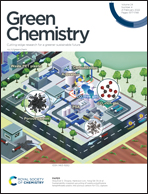Study on the removal of lignin from pre-hydrolysis liquor by laccase-induced polymerization and the conversion of xylose to furfural
Abstract
Eucalyptus dissolving kraft pulp pre-hydrolysis liquor (PHL) is rich in sugar and other biomass resources, which can produce furfural and may serve as a platform molecule for sustainable fuel production. However, the presence of lignin increases the side reactions during the high-value utilization of PHL. Therefore, a novel process technology, consisting of laccase-induced lignin polymerization, was developed in this paper to enhance the removal of lignin. During the study, the mechanism of the action of laccase on lignin was speculated and it was discovered that the effect of laccase on lignin is to polymerize its small molecules. The main reaction of laccase oxidation is the formation of 5-5′ and 4-O-5′ bonds, and occasionally β-O-4′. If position 5 is blocked, other side reactions will occur, including coupling at position 1 and oxidation at position α. Simultaneously, the –OH content of lignin increases under the activation of laccase. Then, the conversion of furfural from the delignified pre-hydrolysis liquor (LPHL) under the catalysis of 2 wt% sulfuric acid was investigated. With the traditional one-pot reactor system, furfural and the reaction medium cannot be separated in time and the degradation of furfural cannot be prevented. The side reactions caused by this, such as fragmentation, condensation and resinification, which is visible to the naked eye, involve the production of humic substances, which becomes the most important factor in the low furfural yield. These side reactions are verified by GC/MS. According to the results in this study, the biorefinery process towards PHL, which allows the separation of lignin by laccase and the conversion of xylose to furfural, improves the overall application of the PHL biomass.



 Please wait while we load your content...
Please wait while we load your content...